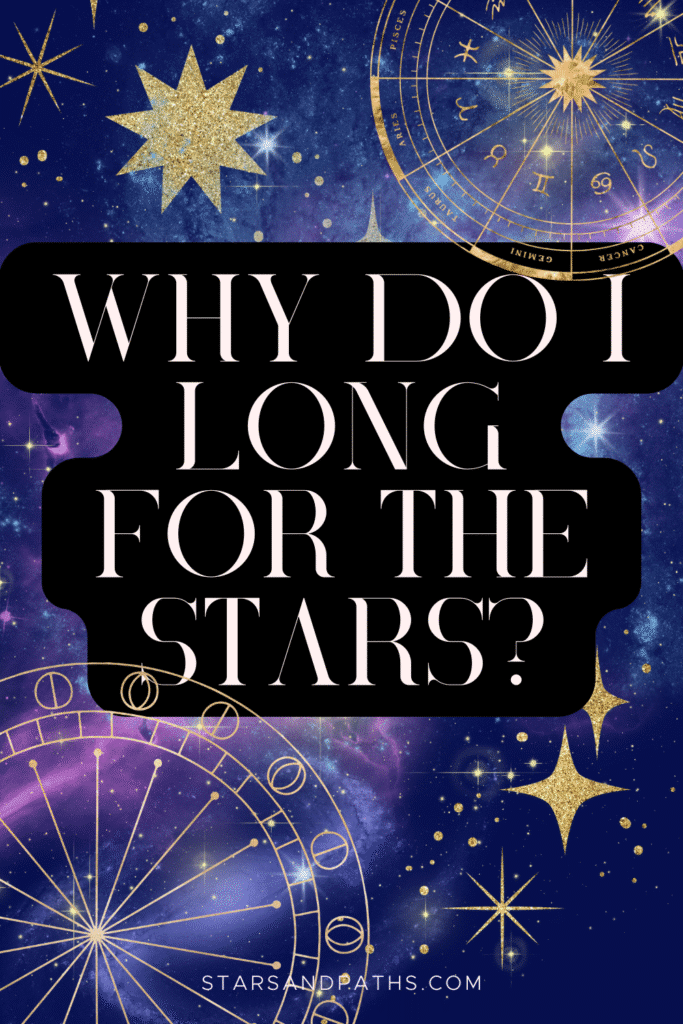Why Do I Long for the Stars and Feel So Connected to Space?
“Stargazing is not just about looking up at the stars, it’s about looking within ourselves and finding our connection to the larger universe.” – Ajaz Ahmad Khawaja
Our world is filled with utterly beautiful and amazing things. Our curiosity and want for knowledge nudges us to explore the universe and see what it has to offer. This includes space, which is extensive and mysterious. And we can’t talk about outer space without speaking about the stars; the magical celestial bodies lighting up the night sky.
The number of stars in our universe seems endless but if you’re a stickler for statistics, it’s estimated that there are one septillion stars in it. Within the Milky Way alone, there are one hundred billion stars, including the Sun!
But what exactly are stars? They’re absolutely gigantic globes that are filled with hot gas made of hydrogen, a bit of helium, and a few more elements. Each star’s life is unique and it can live for millions to trillions of years. As the star ages, it changes and evolves. We humans can relate to this.
Stars have been utilized to create time as well as record the passage of it. Over the years, humans have used celestial navigation. This means, using the stars as points of reference. It’s aided human beings in the planet’s exploration for more than five thousand years. Astronomy has given us a way to comprehend and connect with the stars and outer space. They have been extremely vital to human beings. There were even rock paintings found of the constellations that originated more than forty thousand years ago.
For millennia, the stars have made us wishful, inspiring fascination, dreams, creativity, and love. We are drawn to the stars (some people more than others). There’s a yearning feeling inside. An attraction to them could just be an interest someone has but what if it’s something more? So many questions come to mind. Does it indicate the fact that you have a cosmic history? Do you feel like you’re connecting on a deeper level? Is it a callback to our heritage?
The Exploration of Astronomy
Astronomy is a natural science that explores things that are past our atmosphere. It analyzes celestial items and how they interact with the universe. To better understand the beginning and evolution of the cosmos, astronomers use math, chemistry, and physics. Whereas the creation of astrology was born before astronomy was being utilized. It helped people understand other people better. It categorized and explained distinct personalities and traits.
Are you perhaps like me, an astrophile? In other words, do you adore everything to do with astronomy? Do you feel a connection to celestial things and repeatedly look at the stars? If you answered yes, then you are an astrophile.
Accept the powerful bond you have with the stars. It’s okay. Countless others feel the same way as you. Take advantage of finding local stargazing events, groups, or tours. Connect and share stories and ideas. Maybe they’ve thought of something you haven’t before. These peers can also recommend good equipment to use (if you decide to go this route) for stargazing.
The stars have an undeniable allure. They carry a deep mystery with them, and human beings are naturally curious. They epitomize longing, fascination, and the never-ending journey to learn. Do they have solutions for our own lives? Do they know why we’re here and what our purpose is? You have endless questions, but where do you find the answers? Begin this path by educating yourself about the universe itself, including the planets and stars. Be inquisitive and open to possibilities. Look inward, trust your intuition or “gut feelings.”
Physical Connection
The musician Moby sang “We are all made of stars.” He’s right since human beings were created in the stars billions of years ago as well as numerous star lifecycles ago. Our scientists believe that ninety-three percent of our bodies are made of stardust! The hydrogen and lithium within our bodies (actually) likely carry a small amount from the “Big Bang.” Because of that, the stars almost feel like family. Distant, but family, nonetheless.
Emotional Connection
Anxiety and stress afflict us all from time to time. When this happens, finding a path to your emotional well-being is important. People need an outlet. A way to release the negative energy that plagues us. Some might turn to exercise, yoga, guided meditation, or in this case, a quiet contemplation of the stars. The vastness of space and the unknown that comes with it helps open your mind and emotions. Your current outlook might change when you realize you’re just a small part of a much bigger picture.
Being in the great outdoors is extremely beneficial for us humans. You’ll feel a connection, and like a battery and your body will recharge. Life can be very challenging physically, mentally and emotionally. Many of us have strayed away from Mother Nature and have become exhausted. Restore yourself by doing things outside. Go hiking, do tai chi in a park or (of course) gaze at the stars. Accept and embrace what our stunningly beautiful universe has to offer.
Looking at the stars can also be a great bonding experience with your kids. They are naturally curious beings and will inevitably ask you about the universe and the stars within it. This can also become a teachable experience, opening many subjects up. The stars can be a jumping-off point to astronomy, folklore, philosophy, and more. Look things up in books or online together. Research astronauts, or the International Space Station. It will be fun and educational for everyone involved. There will be no time for tension and emotional worry.
Observing the night sky often helps you slow your pace and center yourself. Your problems here on Earth seem somewhat insignificant compared to the immensity of the universe. It can put things into perspective. You might appreciate other human beings better since you realize we are all in this together. That we share the universe. This will tend to make people more sympathetic to others.
Traditions, Cultures and Religious Significance
In many traditions and cultures, the stars represent the divine. They symbolize guidance, knowledge, and celestial gifts. Many ancient societies turned to the stars for solutions to their problems. They looked upwards to the night sky for help. They believed that the stars contained their gods and ancestors.
It’s noted that stars were used first for religious purposes. Human beings likened them to their Gods, thinking that they lived amongst their light and that the Gods created them. Numerous civilizations and cultures also thought that the positioning of the stars in the sky was their Gods relaying stories. In turn, people named the stars, studied their patterns, and created stories to tell based on them.
Christians hold the Christmas Star (or Bethlehem Star) in high regard. Many who believe in Christianity believe this bright star heralded the birth of Jesus.
In ancient Greek culture, they believed the stars housed brilliant souls who were once Earth-bound. They also represented wisdom and inspiration. They understood their Gods would give them knowledge through the stars in the sky. The people who could understand them and their communication would garner amazing comprehension and insight on all sorts of things.
The Stars and Sleeping
Melatonin is a hormone that helps you drift off to dreamland. The creation of melatonin will rise and fall depending on the time of day (or night) it is. Being near nature will increase this hormonal level in your brain and encourage a great night’s sleep. People who have discovered the joy and benefits of stargazing like to routinely look to the sky before they go to sleep.
What else will aid in good sleep? Turn off all devices so the light that emanates from them won’t disrupt you. Before bed, go out on your balcony, yard, or porch, or look out of a skylight (if you have one and want to stay inside). After having a long and stressful day, you can calm down and relax by viewing the stars.
Creating a Deeper Connection
What makes stargazing so simple, is that it doesn’t cost anything to do. Typically, wherever you are, you can see the night sky with the stars. It’s important to note that you can see the stars better when it’s clear and the sky is darker. You will have e to block out noise and light in a more urban atmosphere as well. Artificial light will disrupt the process.
You can watch them unaided, or you can use equipment to help. A telescope brings the stars and planets closer to you. They vary in price and size. Make sure to research telescopes before impulsively buying one. There are also applications for your smartphone that help you stargaze. These apps also use augmented reality technology. This is where digital information is placed over top things and environments in real life. In this case, it would be the heavens above.
If you plan on viewing the stars outside, dress according to the weather. There’s nothing worse than meditating upon the stars and being too cold because you didn’t wear the right clothing. Make sure you look at the stars in a secure and relaxed environment. This could be in your house, looking out of a big window. Or outside in your yard or a park. If you are in a busy area, try to gain higher ground for a better view as well as a quieter one.
Getting outside to look at the stars, and enjoying the fresh air, just adds to the overall experience. However, if you can’t get outside (or don’t want to) viewing them inside is possible. First step, turn off all the lights in your place. This will help your eyes adapt to the night. Search the sky and focus on a specific star or spot. Many people who stargaze like to practice averted vision. It’s a method for looking at “faint objects” peripherally. You’re not viewing the star dead on but looking slightly off to the side of it. All the while, you would be focusing on your point of interest.
As stated, you can go high-tech and use an app on your devices to classify constellations and stars. Do you prefer more traditional methods of stargazing? Use a star book and penlight then. Either way, make sure you relax and appreciate the cosmic spectacle above you. While looking at the stars, calm yourself and slow your breathing down. You are using your sight, but don’t ignore your other senses. Take everything in and be in the present moment.
A Previous Incarnation in a Space-Faring Race
Some people, including myself, believe in reincarnation. Since the Universe is so huge and uncharted, it’s very likely that there are vast sums of other races out there. As a eternal being (a Soul), you may have experienced one or more incarnations as a being who felt connected to other races and planets because your civilisation was aware of the existence of other races and was space-faring. You had the pleasure of experiencing being in space and you enjoyed it immensely.
As a human on Earth at the time of writing (summer 2025), you can’t travel through space and on a subconscious level, that might make you feel a bit sad. So, whenever you look up at the night sky and see all the glimmering stars, you long to be among them and perhaps this is why.
Final Thoughts on The Topic
The stars awe us. We make wishes upon them. Share our deepest desires. There’s a reason why. It’s because we are connected to them physically, emotionally, and spiritually. It’s easy to stargaze. Anyone can do it, and there’s no right or wrong way to do so. Looking at the vastness of space makes you realize you’re just a small cog in a much bigger machine. It humbles us. It also allows you the opportunity for quiet contemplation or meditation.
As humans, I think we should learn to be more fun-loving and less uptight. When we bring positivity and light with us, we inspire others to do the same. What we put out into the universe; we receive back. It’s worth repeating that we (humans) are just a microcosm of a macrocosm (universe).
Looking at the stars can happen anywhere you are. It can be in a remote country setting or your yard amidst a busy cityscape. If there are no clouds, obstructions, or light pollution, you can be well on your way to a healthier and more joyous you. Human beings have forever been inspired by the stars. They have been painted and written about. Maybe, the creative spark in you might ignite while you’re stargazing as well.
The brilliant Stephen Hawking had many noteworthy quotes, but I think this one feels especially appropriate for what we’ve just been discussing:
“Remember to look up at the stars and not down at your feet. Try to make sense of what you see and wonder about what makes the universe exist. Be curious. And however difficult life may seem, there is always something you can do and succeed at. It matters that you don’t just give up.”
This content, like all content on Stars & Paths Astrology, is entirely human-made. Please feel free to bookmark and share.



